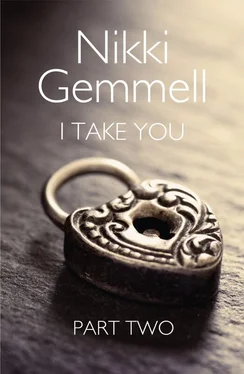I TAKE YOU
Part 2 of 3
Nikki Gemmell
Fourth Estate • London
Table of Contents
Title Page I TAKE YOU Part 2 of 3 Nikki Gemmell Fourth Estate • London
Chapter 22
Chapter 23
Chapter 24
Chapter 25
Chapter 26
Chapter 27
Chapter 28
Chapter 29
Chapter 30
Chapter 31
Chapter 32
Chapter 33
Chapter 34
Chapter 35
Chapter 36
Chapter 37
Chapter 38
Chapter 39
Chapter 40
Chapter 41
Chapter 42
Note
About the Author
By the Same Author
Links
Copyright
About the Publisher
I Take You by Nikki Gemmell Published by Fourth Estate on 23 May 2013
This is Part 2 of a three-part serialization Part 3 unlocked from 23 May 2013

When people are happy they have a reserve upon which to draw, whereas she was like a wheel without a tyre
Connie walks up the grand staircase, slowly, carefully. She feels like a pane of glass with a thousand hairline cracks: one push will shatter her. She will not be broken, she will not. Her tread is so careful, contained, her back stiff. Onward she walks, onward.
To her room, its windows slammed shut by cleaners barked at by Cliff to keep in the house’s heat. Connie flings the panes wide and the cold rushes in and she collapses, belly down, on her bed. She remains there for the rest of the day and deep into the night. Her vocation of serving – submission – is not enough. No. Is meant to be enough. That is her role, as wife.
Everyone has a universal desire to be needed. How does Cliff need her? As his perversion, plaything, pet. That’s it. How much pleasure will she give the others of his choosing? How far will she go? For in the upended way of their world that is the proof of her love for him now: how voluminously she will submit. How removed she is from that girl he first knew. The easy blusher, in the Peter Pan collars and knee-length skirts. She stares at her Louboutins kicked off by her bed, their ridiculously high heels that bind her to her servitude. What woman would ever design a constraint, a buckling, an absurdity, as cruel as those?
And how often has she readily stepped into them.
A visible symbol of her servitude, compliance, decadence. The girl from Cornwall with the beautiful face, bound by all this. Her walk-in wardrobes, summer and winter, her jewellery boxes, her private safe. How she has always loved her shoes and her clothes; the quickening at a singular vintage dress that fits, the Edwardian necklace, the deco cuff, the Stephen Jones hat – grabbed! – and so often now. The thrill of which has never passed. Complicit, in all of it.
Rain comes. The windows stay wide. Usually Connie feels cocooned within that sound but tonight she feels pummelled by it. The wind is high, haranguing her as if pushing her away, far away, to somewhere else. Gradually it all clears, the sky is orange as it always is, the light pollution scattering a proper, rich, weighty dark; the dark of the land, the untrammelled earth. Water drips from the eaves, endlessly drips, deep into the early hours; it feels like her life leaking away, in wakefulness and worry. The whole house of cards has come tumbling down, just like that; she has lost the sexual urge, just like that, with Cliff, with any man.
He does not come, of course, he would not. She has humiliated him, stepped out of order, done what he did not want. And meanwhile she has surfaced into something else.
A new land, a strange new life, not sure what. No ballast to it, that’s all she knows.
He thought her beautiful, believed her impeccably wise; dreamed of her, wrote poems to her, which, ignoring the subject, she corrected in red ink …
‘Would it perhaps be a good thing if you had a child by another man? Con? What do you think?’
Dinner, the next night. Cliff thinking aloud through thick silence, trying to ensnare his wife with talk, to work out this new person; and there is Connie, all changed, flinched, hearing him as if from afar, as though through an old diving helmet, a weight stifling, airless, wrong.
‘You’d think we’d be able to arrange this sex thing as we arrange going to the hairdresser, wouldn’t you? In this day and age …’ Cliff is now snapping out his thoughts. ‘Since some fucking trees on a ski slope – that shouldn’t have been there in the first place – have given us a checkmate, physically, in that department.’
He is talking at Connie, not with her, as he does, he always does. ‘I don’t know,’ she is saying, ‘I don’t know,’ unable to articulate anything of her new, strange roar to him, her silent roar. A weary yearning, a dissatisfaction has started in her but he cannot see it and she does not expect him to. It’s all talk, all nothing, a wonderful display of nothingness, Connie thinks as she looks around her at all their careful objects that were procured by the interior designer, so tastefully placed, so exquisitely photographed, so sucked of life. There is no love behind any of it, no passion, no shared stories, no mess or mistakes, not even the shard of a fight. Because they don’t care enough , she thinks. Neither of them. Not a single thing here has been picked out by either of them, not even the family portraits in silver frames crowding a sideboard from Churchill’s family home. A child? Into this?
Cliff does not want one, never has, a new creature who would interfere so meddlingly with everything he’s got. He would lose control, what he fears more than anything; he’s always conveyed that; it’s too seismic a shift, too slippery and uncontainable for such an ordered life. Or perhaps he has a child somewhere else, has always had one. He works long hours, is a fair bit older, could cram a lot into all his time spent apart from her.
Connie doesn’t care enough.
She does not respect this world. He has no idea of this. She would not want her own child to follow in Cliff’s footsteps. A banker? Whose sole purpose is to be fêted in Forbes , to work his way up the rich list? Please. It’s all about vanquishing everyone else; if colleague X acquires 200 acres in Oxfordshire, they must have 300. If colleague Y has four cars they must have five and a multi-car, underground basement garage to house them. It is all display, ridiculous plumage. The most robust bonus, the most exquisite house, the cinema room and the servants’ quarters, the predictably lavish milestone birthdays in exotic places, the paintings, the cutlery, the crockery, glassware, wife. It is all so predictable, and utterly of a type; like homosexual men they must follow each other meticulously in the way they dress, what they acquire, how they display their wealth, act. And Connie is chafing, chafing at the bit.
All around her are bankers’ wives having a fourth child, for even that is competitive, the bigger family for the artfully smug Christmas card photo, the new mode of accessorizing; four because they have the funds and the help and the ease to do it, four because look at us, we fuck a lot. Clifford wants other men to envy him, as simple as that; but not in terms of the child-gaggle, he’s often conveyed that. He doesn’t like anyone’s child – despite having four godchildren – they’re all too rude, loud, obnoxious, spoilt. It’s all a great and ugly nothingness and for Connie, in this moment, to accept the great nothingness of life seems to be the end of living.
‘Con, Con, what is it you want? Speak to me.’
Читать дальше













